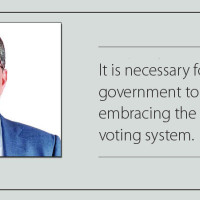- Wednesday, 11 February 2026
Call For Fair Distribution Of Resources
At the moment, the country has experienced a semblance of political order. But beneath it lies economic paradox as the parliament is deliberating on the budget for the upcoming fiscal year starting from mid-July. Officially, the new budget has been described as pragmatic and balanced, not populist. A whopping amount of annual outlay goes for meeting the general expenditures (61.31 per cent) while around 18.94 per cent of the total budget has been set aside for development spending. Ironically, the sources of capital budget have been the foreign grants, loans and internal borrowing. Even if the development budget is managed, its spending has been dismal for years. This is a reason why the pace of development has been slow despite the high-sounding claims and promises for rapid and broad-based economic growth.
There is obviously incongruous approach adopted to realise ‘socialism’ through the execution of neo-liberal policy. The budget is primarily premised on the principle of free market economy barring some targeted allocations under the social security schemes. Weak manufacturing and dwindling agriculture but high dependence on import-based customs and remittances have vitiated real economy essential for strengthening basic infrastructures for the delivery of public goods such as healthcare, education, social security, culture and environment.
Political connection
The country has adopted federal system that promotes decentralisation of powers and fair distribution of resources among the three tiers of government. The budget should be allocated for the places where it is needed the most. However, we have encountered the opposite trend for the last more than three decades. The budget distribution has been influenced by political powers and access. Since the early 1990s when the country ushered in the multiparty system, the powerful ruling party leaders have been taking a lion share of the budget for their constituencies to strengthen their vote bank. Where the leaders are strong, there are better roads, hospitals and universities. Not only this, media, business, civil society and NGOs/INGOs also concentrate there.
Such constituencies disproportionately receive greater media attention, reinforcing the soft powers of given politicians. But this will eventually push the backward areas into poverty. Building public infrastructures in any part of country is good but when the facilities are accumulated in certain places, this will give rise to many economic backwaters, making development imbalanced and unjust. Districts in Karnali, Sudurpaschim and Madhes provinces have fallen behind in the human development indices because of this faulty policy.
In order to please their constituencies, each lawmaker was allowed to spend Rs. 50 million under the Constituency Infrastructure Development Programme, which was also known as Constituency Development Fund (CDF) but last year the Supreme Court instructed not to give money to lawmakers for development works, citing that the constitution has not authorised them to perform executive tasks and their main responsibilities is to perform legislative works in the federal and provincial parliaments. After the court issued an interim order to halt the release of funds for the CDF, the lawmakers accused it of infringing upon the jurisdiction of the legislature.
However, many lawmakers, ministers and bureaucrats are now implementing their pet projects via the Ministry of Urban Development after CDF has been rendered illegal for the time being, according to media reports. The ministry has received Rs. 92.63 billion, 4.98 per cent of the total budget, for the new fiscal year for the purpose. Now it is spending Rs. 66.17 billion allocated for the current fiscal year. Those lawmakers, who have no access to power centres, have lamented that they have to plea before the ministers and bureaucrats for budget, resulting in the loss of dignity. If a minister succeeds to get budget for scores of projects being implemented in his/her own election constituency, other constituencies will be deprived of necessary resources and development. This will undermine the spirit of equitable distribution of national resources, the fundamental of federalism.
Another element that guides the formulation and allocation of budget is populism. It is a concept developed against entrenched political establishment and elitism. Under the liberal order, populism is interpreted pejoratively but its advocates take it in a positive light and describe people as ‘moral force’ and the elites as self-serving groups. However, in Nepal, it is not sure how much the ruling party leaders are aware of the theoretical underpinning of populism when they roll out populist programmes. The populist programmes mainly seek to gain short-term goals without considering their viability in the future. There is conspicuous apathy towards pooling sufficient resources to support such programmes.
Catchy slogans
Recently Madhes Province government has introduced a slogan ' hat-hat ma sabari, ghar-ghar ma rojgari' (vehicles to every person, employment in every household) in its policy and programmes for the upcoming fiscal year. The scheme sounds attractive but unfeasible given the scarcity of funds, infrastructure and human capital in the province. The newly formed Madhes government, led by Janamat Party leader Satish Singh, also decided to allow each lawmaker elected under the first-past-the-post category to implement development projects worth Rs. 50 million and Rs. 5 million to those lawmakers elected under the proportional representation category to implement projects in their constituencies. But the SC has ordered a show cause notice against the decision and asked the government to justify the legal basis for its decision.
A judicious distribution of budget is vital for inclusive growth and sustainable development. If it is allocated on the basis of political connection and favouritism, this will be an injustice to the marginalised people and regions. At the same time, those responsible for implementing the projects must be accountable to their decisions and actions so that erring representatives and contractors will be brought to book. Only then can the budget's stated objectives, priorities and strategies will be fulfilled.
(The author is Deputy Executive Editor of this daily.)
















